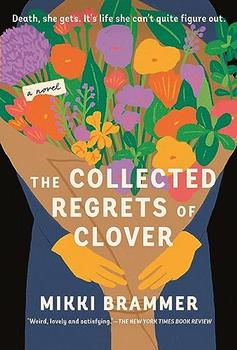Summary | Excerpt | Reading Guide | Reviews | Beyond the Book | Readalikes | Genres & Themes | Author Bio

A Novel
by Mikki Brammer
"I thought you weren't coming," he said with the quiet despair of a forgotten child.
"I promise you that won't happen," I said, pressing his leathery hand between mine.
And I always keep my word. Shepherding a dying person through the last days of their life is a privilege—especially when you're the only thing they have to hold on to.
* * *
Snowflakes whirled erratically as I began my walk home from Guillermo's cramped studio apartment in Chinatown. I could've taken the bus, but it always felt disrespectful to slot right back into routine life when someone had just lost theirs. I liked to feel the icy breeze nibbling at my cheeks as I walked, to watch the cloud materialize then vanish with each of my breaths—confirmations that I was still here, still living.
For someone so accustomed to witnessing death, I always felt a little adrift afterward. A person was here on earth and now they were gone. Where, I didn't know—I was mostly agnostic when it came to spiritual matters, which helped me make room for my clients' chosen faiths. Wherever he was, I hoped Guillermo had been able to leave his bitterness behind. From what I could tell, he hadn't been on very good terms with God. A small wooden crucifix hung adjacent to his single bed, the torn, yellowed wallpaper curling around its corners. But Guillermo never looked at it directly to seek comfort; he snuck darting glances, as if avoiding the scrutinizing gaze of an authority figure. Mostly, he positioned himself with his back to it.
In the three weeks I spent visiting Guillermo, I'd learned the details of his living space by heart. The thick layer of grime on the outside of his only window that muted the daylight, rendering the space fittingly somber. The piercing shriek of metal against metal from his decrepit bed frame every time he adjusted his weight. The bone-chilling draft that came from everywhere and nowhere. The sparse occupants of his kitchen cabinets—one cup, one bowl, one plate—that were testaments to a life of loneliness.
Guillermo and I probably only exchanged a total of ten sentences during those weeks. We didn't need to say more than that. I always let the dying person take the lead, to decide if they want to fill their final days with conversation or to revel in silence. They don't need to verbalize their decision; I can just tell. It's my job to stay calm and present, letting them take up space as they navigate those last precious moments of life.
The most important thing is never to look away from someone's pain. Not just the physical pain of their body shutting down, but the emotional pain of watching their life end while knowing they could have lived it better. Giving someone the chance to be seen at their most vulnerable is much more healing than any words. And it was my honor to do that—to look them in the eye and acknowledge their hurt, to let it exist undiluted—even when the sadness was overwhelming.
Even when my heart was breaking for them.
* * *
The warmth of my apartment was almost stifling compared to Guillermo's place. I shrugged off my coat and balanced it on top of the mass of winter attire on the rack by my front door. The rack protested, sending my wool peacoat into a crumpled heap on the floor. I left it be, telling myself—as I did with most of the accumulating clutter in my apartment—that I'd deal with it later.
To be fair, not all of the clutter belonged to me. I'd inherited the enviably located two-bedroom from my grandfather after he died. Well, technically, I'd been on the lease since I was a kid. It was a shrewd move on his part to ensure that no amount of New York City real estate bureaucracy could cheat me out of my rightful claim to his rent-controlled legacy. For seventeen years, we'd shared the third-floor apartment in a brownstone that looked comparatively unloved next to its manicured West Village neighbors. Grandpa had been gone for more than thirteen years now, but I still couldn't bring myself to sort through his belongings. Instead, I'd gradually slotted my own possessions in the limited spaces between his. Even though I spent my days looking death in the face, I still couldn't seem to accept that his absence from my life was permanent.
Excerpted from The Collected Regrets of Clover by Mikki Brammer. Copyright © 2023 by Mikki Brammer. Excerpted by permission of St. Martin's Press. All rights reserved. No part of this excerpt may be reproduced or reprinted without permission in writing from the publisher.




The worst thing about reading new books...
Click Here to find out who said this, as well as discovering other famous literary quotes!
Your guide toexceptional books
BookBrowse seeks out and recommends the best in contemporary fiction and nonfiction—books that not only engage and entertain but also deepen our understanding of ourselves and the world around us.